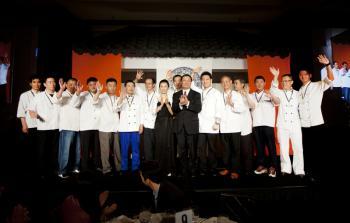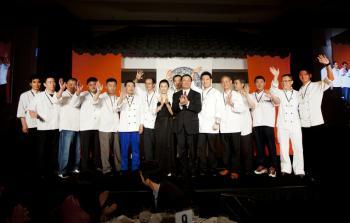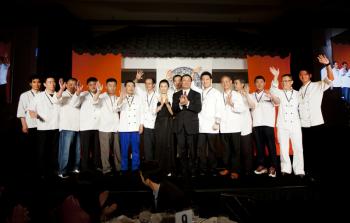Even in New York, where the best and greatest variety of ethnic food is easily within reach, it is rare to feast on authentic Chinese food from all five major regional cuisines: Cantonese, Sichuan, Huaiyang, Northeastern, and Shandong.
But local foodies were in luck, as Chinese language television network, NTD’s annual International Chinese Culinary Competition held live in Times Square ended in a 10-course banquet prepared by the award-winning chefs on October 3.
The event attracted many food connoisseurs who were anxious to experience Chinese cuisine cooked in an ancient traditional manner that has largely been neglected and ignored in today’s era of fusion and experimental cooking.
Jeffrey Steingarten, renowned food critic at Vogue magazine and judge for Food Network’s Iron Chef America, was also at the banquet on Sunday. Having made many trips to China, he was disheartened to find that the Chinese food offered in the West was not authentic at all. On one particular trip, he traveled to Chengdu, capital of Sichuan province, and tasted authentic Sichuan cuisine for the first time. “I found, when I went to Chengdu for 10 days, there was almost no Sichuan food in America...I was so happy to go to Chengdu and have the real food, and then I was so happy tonight, because after one taste you know that it’s the real thing.”
But local foodies were in luck, as Chinese language television network, NTD’s annual International Chinese Culinary Competition held live in Times Square ended in a 10-course banquet prepared by the award-winning chefs on October 3.
The event attracted many food connoisseurs who were anxious to experience Chinese cuisine cooked in an ancient traditional manner that has largely been neglected and ignored in today’s era of fusion and experimental cooking.
Jeffrey Steingarten, renowned food critic at Vogue magazine and judge for Food Network’s Iron Chef America, was also at the banquet on Sunday. Having made many trips to China, he was disheartened to find that the Chinese food offered in the West was not authentic at all. On one particular trip, he traveled to Chengdu, capital of Sichuan province, and tasted authentic Sichuan cuisine for the first time. “I found, when I went to Chengdu for 10 days, there was almost no Sichuan food in America...I was so happy to go to Chengdu and have the real food, and then I was so happy tonight, because after one taste you know that it’s the real thing.”








